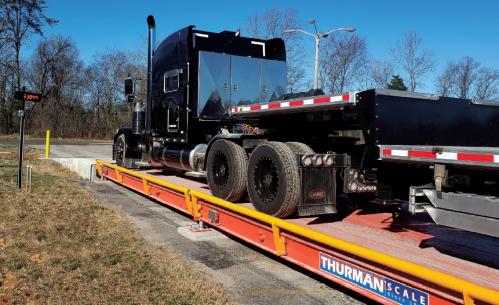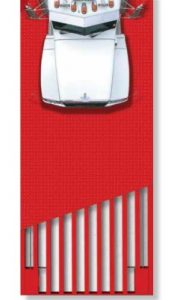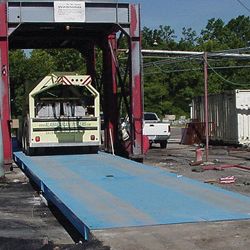Are you looking to optimize the accuracy of your truck scale measurements and ensure compliance with local and industry standards? Then, focusing on having a consistent truck scale calibration plan is vital. This comprehensive guide will walk you through the importance of calibration, the essential tests, and how to choose the right scale calibration service provider, ultimately helping you achieve optimal performance and longevity for your truck scales.
Important Points
-
Regular calibration of truck scales is essential for accuracy, financial security, and safety.
-
Factors such as usage, environment, and application impact the performance of a truck scale.
-
Regular inspections, calibrations, and scale maintenance are necessary to ensure accurate readings & reliable functioning over time.
The Importance of Truck Scale Calibration

Truck scale calibration procedures are crucial for obtaining precise measurements, avoiding financial losses due to incorrect payments for shipments, and upholding safety regulations by preventing overloaded trucks. Calibration is the process of verifying a scale’s accuracy using certified test weights to compare the weight reading to the known value of the certified test weight, ensuring the most accurate measurement possible. If the weighment generated by the scale being calibrated does not match the known value of the certified test weight, (slight errors may still be within tolerance), the scale is out of tolerance, and technicians will adjust the scale until the reading accurately reflects the known value of the test weights.
Several online scale calibration software providers offer a calibration management tool which allows customers the ability to:
-
Monitor their calibration status
-
View equipment calibration and test histories
To ensure that truck scales deliver accurate measurements and function at their best, a consistent scale calibration schedule is a must. The easy way to do this is with a Service Agreement. We recommend contacting our service department and setting up a service agreement. You can specify how often you want your scale calibration done and you get reduced service rates and discounts on scales. Call (919) 776-7737 to get started!
Factors Affecting Calibration
Several external factors can impact the calibration of truck scales, such as usage, environment, and application. These factors make regular calibration necessary to ensure that the truck scales are providing precise measurement and operating optimally.
Gaining a clear understanding of calibration-affecting factors allows you to keep your truck scale accurate and dependable.
Legal Requirements and Standards
Legal requirements and industry standards necessitate proper calibration and certification of truck scales to ensure compliance and quality assurance. Truck scale calibration must adhere to legal-for-trade standards, using certified test weights for calibration purposes. Scale certification is mandated by the state, while scale calibration is not always mandated, ensuring the most precise measurement possible.
Calibrating truck scales a minimum of two times yearly is advisable. Adhering to these requirements and industry standards not only helps maintain accuracy but also demonstrates your commitment to maintaining a reliable and compliant weighing system.
Initial Calibration and Certification
The initial scale calibration and initial certification process, which accounts for factors like gravity tolerance, scale location, and scale model, is critical to ensure the scale operates correctly and complies with all relevant legal and industry standards.
New scale owners must ensure their truck scales are tested and certified for performance, guaranteeing that the scale is accurately weighing and ready for use.
The Calibration Process
Precision testing and adjustments are involved in the calibration process to ensure accurate measurements. NIST Handbook 44 outlines that the calibration weights loaded onto the test cart should follow the size and capacity guidelines specified for the particular scale. This ensures accurate testing and results.
At Central Carolina Scale, the procedure for standard calibration entails loading 20,000 lb of certified test weight into the 5,000 lb certified test cart and using the test cart to conduct the scale section and load cell tests.
The initial calibration process requires thorough testing of each section of the scale with the required time and precision to ensure the proper functioning of the scale. Adherence to a meticulous calibration process instills confidence in your truck scale’s accuracy and reliability.
Obtaining Certification
Obtaining certification from a licensed scale service company guarantees adherence to legal requirements and industry standards, ensuring compliance and quality assurance. The process for obtaining certification typically involves initial installation by a certified scale provider, inspection and calibration by licensed technicians, and obtaining legal-for-trade certification.
Some scale companies may have ISO 17025 accreditation, but that is not a requirement to check and calibrate scales. The most important requirement for checking truck scales is that the scale technician is experienced and factory trained and that the certified NIST Class F test weights used are accurate. This dedication to quality and customer satisfaction is paramount.
Essential Calibration Tests for Truck Scales
Indispensable calibration tests for truck scales include linearity, repeatability, and section tests, which guarantee accuracy and consistency of weight readings.
These tests ensure that your truck scale provides precise measurements across its entire range and remains consistent in its readings for the same load, ultimately enhancing the reliability of your weighing system.
Build Up Test
The build up test allows you to place an object on the scale. Its weight is recorded. Then a known weight is added as well. This allows you to test the scale accuracy far beyond the 25,000 pounds of “certified” weight that the scale test truck carries. Conducting a buildup test allows you to verify the consistency and accuracy of measurements across your truck scale’s entire range or span, ensuring your confidence in its performance.
Repeatability Test
The repeatability test for truck scales ensures that the scale is providing consistent readings for the same load. This test involves sequentially adding and removing the same volume of weight to the scale, guaranteeing consistent and precise results.
Carrying out a repeatability test lets you verify that your truck scale maintains consistent readings and retains its accuracy over time.
Section Test
Truck scales are often 70 or 80 feet long. Therefore, they are shipped in multiple platforms that are connected together at installation. The section test evaluates the accuracy of each section of the scale, ensuring consistent and uniform performance. This test involves inspecting and testing the scale’s precision at multiple points or sections to guarantee that the scale is working properly and providing precise weight measurements. This is often done with Class F weights and a cart that can be placed anywhere on the scale platforms.
Performing a section test allows you to ensure that each section of your truck scale delivers precise weight measurements, a critical aspect for businesses relying on accurate weight data.
Regular Calibration and Maintenance
Regular calibration and scale maintenance are essential for ensuring optimal performance and extending the lifespan of truck scales. Maintaining a regular calibration schedule helps preserve the accuracy and reliability of your weighing system, and allows for early identification of potential issues before they escalate.
In addition to regular calibration, scheduled inspections should be conducted alongside calibration to address any debris, damage, or repairs needed for the truck scale.
Cleaning and care tips for your truck scale include regular cleaning, checking for wear and tear, and protecting the scale during extreme temperatures. By following these tips and conducting regular calibration, you can not only maintain the accuracy and reliability of your truck scale but also extend its lifespan, ensuring a long-lasting investment.
Calibration Frequency
The calibration frequency for truck scales depends on various factors, including usage and environmental conditions. Generally speaking, busy truck scales should be calibrated on a monthly or quarterly basis, while less-used scales should be calibrated 1-2 times per year. Creating a clear schedule and following up on scheduled calibrations can confirm if personnel are carrying out the calibrations as required.
Comprehending the factors impacting calibration frequency and following a recommended scale calibration schedule helps keep your truck scale accurate and reliable, thereby preventing potential issues and costly downtime.
Scheduled Inspections
During scheduled inspections, it is necessary to conduct calibration and address any debris, damage, or repairs that may be required for the truck scale. Employees should check for debris, such as dirt, in or under the scale, as well as any visible damage to wires and other scale components.
Performing scheduled inspections and promptly addressing any issues help maintain your truck scale’s peak performance and condition, thereby ensuring its long-term accuracy and reliability.
Cleaning and Care Tips
Regular cleaning for truck scales is critical as it helps guarantee that the scale is clear of dirt and debris that can affect its precision. To assess wear and tear on truck scales, an inspection should be conducted for any signs of damage or corrosion, and the calibration of the scale should be verified to ensure accuracy. Often when you mention cleaning and truck scales, you are referring to the underside of the scale and not the top of the scale deck. It is very common for dirt, rocks, and debris to get stuck or “buildup” between the ground and the scale weighbridge. This can certainly cause inaccurate measurements.
Adhering to these cleaning and care tips helps you preserve your truck scale’s optimal performance and hopefully even extend its lifespan.
Choosing a Calibration Service Provider

When selecting a scale calibration service provider, it is important to consider factors such as expertise, location, and turnaround time. A careful consideration of these factors ensures that your truck scale receives top-notch calibration services, thus maintaining its accuracy and reliability.
Accreditation and Expertise
Experience is important when it comes to checking truck scales. There are numerous brands of scales in the market and there are numerous technologies such as digital load cells, hydraulic load cells, and analog load cells.
Experienced scale technicians have the knowledge and factory training to work on these scales. ISO accreditation is not required to check or calibrate truck scales. A state licensed scale technician using Class F weights and understands Handbook 44 is what is needed and are crucial factors to consider when selecting a calibration service provider for truck scales. The calibration service provider should be compliant with industry regulations and possesses the necessary expertise to calibrate truck scales precisely.
Selecting a calibration service provider with the right knowledge and expertise gives you confidence in your truck scale’s accuracy and reliability.
Location and Turnaround Time
Considering location and turnaround time can help minimize downtime and ensure prompt access to calibration services. The typical turnaround time for a calibration service provider is usually within 1 to 2 business days. Local calibration services are available in various locations, ensuring that you can find a service provider that meets your needs and minimizes downtime.
Summary
Mastering truck scale calibration is essential for ensuring accuracy, compliance, and longevity of your weighing system. By understanding the importance of calibration, the various tests involved, and how to choose the right calibration service provider, you can optimize the performance of your truck scales and safeguard your investment. Stay ahead of the curve by implementing regular calibration and maintenance practices, ultimately reaping the benefits of an accurate and reliable weighing system.
FAQ about Truck Scale Calibration Frequency
How do you calibrate truck scales?
Calibrating truck scales is a crucial step to ensure their performance and accuracy. This is done by factory trained scale technicians using traceable weight sets. And, it should be done on an ongoing basis to check for any discrepancies and maintain a high level of reliability. Proper calibration involves careful testing and adjusting using certified test weights according to the manufacturer’s specifications.
How often do truck scales need to be calibrated?
Scale calibration varies based on several factors. Scales used on a regular basis should be checked more frequently. Truck scales should be checked and calibrated at a minimum of a couple times each year to ensure accurate readings. Frequency of weighing and the age of the scale may also affect the frequency of scale calibration required.
How accurate are truck scales?
A Truck scale displays an accurate reading the vast majority of the time and overall is highly accurate, with a tolerance of 0.1% of the applied weight as stated in Handbook 44. For example, for 25,000 pounds of weight, the scale would be allowed +/- 25 pounds.
What else do I need to know?
Look for an established scale company with experienced scale technicians. We also recommend choosing a scale company that sells and services multiple brands every day. This is important since there are several scale companies out there across the country that basically sell 99% one brand. Also look for a scale company that stocks replacement scale parts like weight indicators, load cells, boards, etc…. If something is broken, you want it fixed ASAP and not waiting around for days or weeks.
What are the essential calibration tests for truck scales?
Essential calibration tests for truck scales include load tests, buildup tests, repeatability, and section tests to ensure accuracy and consistency in your truck weighing.
If you’re interested in truck scale calibration you can contact us (919) 776-7737 or complete the RFQ form on our website. Thank you very much for visiting our website.
